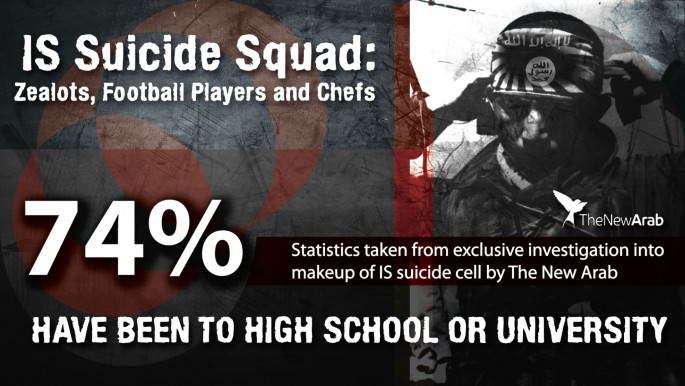New study finds IS recruits likely well-educated
A new study by the World Bank has found that recruits into the Islamic State (IS) group were better educated than their average fellow citizen, contrary to popular belief.
"We find that Daesh did not recruit its foreign workforce among the poor and less educated, but rather the opposite," said the newly released study titled "Economic and Social Inclusion to Prevent Violent Extremism", using an Arabic acronym for the militant group.
Moreover, those offering to become suicide bombers ranked on average in the more educated group.
"An important finding is that these individuals are far from being uneducated or illiterate. Most claim to have attended secondary school and a large fraction have gone on to study at university," the report said.
Almost without exception, fighters joining IS's Syria and Iraq-based forces had several more years of education in their home countries - whether in Europe, Africa or elsewhere in the Middle East - than the average citizen.
Out of 331 recruits described in a leaked Islamic State database - most of whom reported having a job before traveling to join IS - only 17 percent did not finish high school, while a quarter had university-level educations.
Only those from Eastern Europe were below the average, and only marginally so, according to the study.
"Foreign recruits from the Middle East, North Africa and South and East Asia are significantly more educated than what is typical in their region," the report said.
 |
An important finding is that these individuals are far from being uneducated or illiterate. |
 |
The study, which aimed to identify socioeconomic traits that might explain why some are drawn to the extremist group, made clear that poverty and deprivation were not at the root of support for the group.
"Poverty is not a driver of radicalisation into violent extremism," the report said.
"Instead, the lack of economic inclusion seems to explain the extent of radicalisation into violent extremism."
Noting that unemployment was a major drive behind extremism, the report concluded that policies promoting job creation not only benefit young people seeking jobs, but may also help thwart the spread of violent extremism and its attendant effects on national and regional economic growth.
'Martyrdom unit'
Based on leaked files of 121 members of an IS suicide squad named "martyrdom unit", an investigation by The New Arab in March found that 74 percent had secondary school or university degrees.
The data revealed that 50 of the men had completed secondary school, 40 had university degrees or were enrolled in university, only 28 had finished primary school, while three did not record their level of education.
As in the World Bank study, the investigation found that the majority of the men were employed and came from the middle or even upper class.
"Those who carried out the September 11th attacks and other [terrorist] activities across the world do not come from a poor background," said professor of political ethics, Mohammad al-Shinqiti.
"They come from a varied social and class backgrounds, most of which are middle-class and some are even from the upper class."
Political analyst Marwan Shihadeh believed that financial rewards have no value for those who commit suicide attacks as they seek to end their lives.
"Some of those who commit suicide have jobs that bring in a high level of income," Shihadeh said, "But the reward they are seeking is 'in heaven' and the Houris [virgin women]."
 |
| [Click to enlarge] |
![Islamic State fighters [AFP] Islamic State fighters [AFP]](/sites/default/files/styles/image_345x195/public/media/images/B78A324B-B196-4988-AD97-5D9A958AD02B.jpg?h=d1cb525d&itok=_FtysUZ0)




 Follow the Middle East's top stories in English at The New Arab on Google News
Follow the Middle East's top stories in English at The New Arab on Google News


